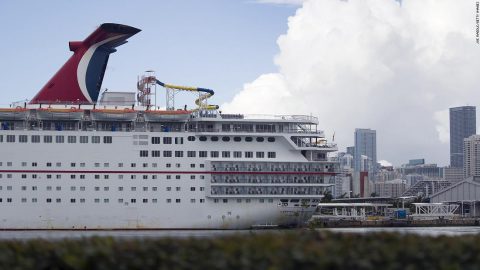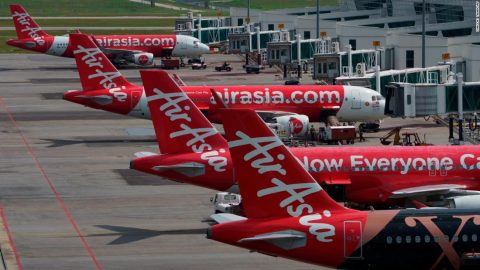(CNN) — In the week since Ryanair flight FR4978 from Athens to Vilnius was forcibly diverted to Minsk, travel in Europe already looks very different.
The directive, issued Wednesday by the European Union Aviation Safety Agency (EASA) under the form of a Safety Information Bulletin (SIB), called on all airlines “with their principle place of business in one of the EASA member states” to avoid Belarusian airspace. They advised that all other airlines should do the same, wherever they are based.
The directive came a day after European Commission President Ursula von der Leyen announced that the bloc was “closing our airspace to planes from Belarus,” calling on EU airlines not to fly over the country after the “outrageous behavior” shown on Sunday.
It’s not just the EU. Other major carriers including Singapore Airlines have also vowed to bypass Belarusian airspace.
There were other implications, with Russia — an ally of Belarus — taking several days to grant Air France and Austrian Airlines flights to Moscow the clearance to use Russian airspace to divert around Belarus, prompting cancelations.
So how big a deal is this? Huge, say industry insiders — big enough to have already shaken the aviation map of Europe, and big enough to have knock-on effects beyond the continent — particularly if the situation escalates further.
If it did, passengers could see their flight times increased, a rise in fares across the networks, and even long-haul, nonstop flights needing to make refueling stops along the way.
Of course, that’s a worst-case scenario. But coming after a disastrous 15 months for aviation, as the travel industry in Europe gears up for the busy summer season amid ever-changing travel restrictions and passenger concerns about the pandemic, there couldn’t be a worse time to add another layer of uncertainty.
“I think it does affect consumer confidence — especially if you’re flying in a region near Belarus.
“Now that they’re not flying over its airspace, that’s good — governments have acted swiftly to restore confidence — but I think it’ll throw up questions for consumers over who they’re flying with, which points they’re flying between and how they’re flying between them. If you were flying from Athens to Lithuania, or in the region around Russia, you might think twice.
“It’s the fact that it’s happened that will make people start to question it.”
‘Significant impact’

The Ryanair flight was traveling from Athens to Vilnius when it was forced to land in Belarus.
ONLINER.BY via AP
The events, described by some governments as a state-sponsored hijacking, have “inevitably redrawn the aviation map of Europe,” says one airline industry insider, who wanted to remain anonymous due to the risk of being identified. (For those currently working in aviation, the topic is dynamite.)
But the issues don’t just end there, they say.
“The problem you have is the challenge around where you draw the new map — that whole region has restrictions.
“There are already restrictions flying over Ukraine” — after the 2014 incident in which Malaysian Airlines flight MH17 was shot down.
“The impact [of dodging Belarusian airspace] is quite significant — no British operator, including Ryanair, has been flying over Crimea for some time, and that situation may take decades to resolve.
“So Belarus had seen a huge increase in traffic because people were going around Ukraine.”
And the impact of these workarounds isn’t just a question of logistics — diverting around a country can mean longer flights, more fuel burned, impromptu stopovers for refueling, and higher operation costs — including extra crew, if the longer flight time pushes them over their limits, or requires more crew.
“They were caught out because they were already airborne, but the challenge is now that it appears Russia may be denying access to some of their airspace as well. If that happens, it will be a new challenge,” they say.
“Airlines will either have to go very far north into the polar region, or to go down to the Gulf States — but then most European carriers would avoid flying over Iraq and Iran. So, they’d probably go over Egypt, Saudi Arabia and across India.
“There’s a big lump of airspace which is strategically important to airlines and is now being denied them — and there’ll be a knock-on effect on flight times, cost, and environmental impact.”
If a flight goes from nine hours to 10, for example, by and large the plane will need three pilots instead of two. Anything longer, it may require even more pilots.
“There’s a huge cost implication,” says the insider. And, they say, while it’s unlikely to see a fare hike on affected routes, if restrictions continue (and increase), there could be a general raising of fares across networks to take the higher operating costs into account.
The potential fallout

The Belarus incident could cause problems for air traffic in Europe.
Catherine Ivill/Getty Images
Everyone in the industry agrees that if diversions become a long-term thing, it’ll be a headache.
As well as the increased fuel burn and longer flight times, he says, any unplanned stops can send crews over their allotted hours. “They might need to be swapped out, with a new crew being flown in. There are significant consequences to this sort of disruption,” he says.
However, here’s the good news — Nicholson doesn’t think the situation as it stands will cause massive disruption for intercontinental traffic. “For flights within Europe, the disruption will be relatively bigger, but for long-haul flights there’s little risk of disruption,” he says — since flight schedules are already padded to allow for extra time.
He notes, though, that any kind of “unplanned disruption is more risky than sticking to schedule” — whether that’s finding out whether the aircraft has enough fuel, to noting the diplomatic situation in the state a plane might divert to for a refuel. Not to mention Covid-19 — nobody knows what would happen if a flight between two countries on reciprocal “safe lists” had to make a pitstop in one with Covid restrictions.
A breach of “sacrosanct” rules

The Ryanair incident is being seen as a breach of the 1944 Chicago Convention governing airline safety.
Petras Malukas/AFP/Getty Images
Nicholson’s main concern is less about adding time onto your summer flight — and more about the principle at stake, which he says has the potential to have massive ramifications for all of us in the future.
The rules and regulations around airline safety are “absolutely sacrosanct,” he says — and have been enshrined in international law since 1944, in the Chicago Convention, which established freedom of the skies after the Second World War. (The ICAO Council is currently investigating whether Belarus has contravened the Chicago Convention, a spokesperson told CNN.)
“This is the first time that a mechanism designed to ensure the safety and security of air travel has allegedly been used for political ends, and what’s also worrying is that the political response to that has also been to use another mechanism designed to ensure flight security for political ends. That’s the more worrying aspect,” he says.
If you start playing politics with flight safety, you’re setting out on a slippery slope, he argues.
Apart from anything else, Russia’s actions — not allowing some European carriers to land this week — have been “the manifestation of the same issue.”
“I think perpetuating the use of airspace management for political ends is quite a dangerous thing for countries to be doing — not necessarily now, but it sets a precedent of people being able to do this,” he says.
Advising carriers that they shouldn’t operate in a certain airspace is political in this case, he thinks.
And if you do that once, “any time that happens globally, whenever there’s advice or prohibitions put out with respect to airspace, people will start wondering whether that’s actually for safety reasons — and that undermines the veracity of the whole system.
“Of course, if it’s proven or there’s a strong suspicion that Belarus did falsify a security threat to get the plane to land, there needs to be a political response.
“But there are sanctions that can be put in place — arguably the revocation of [Belarusian airline] Belavia’s operating licence in the UK is an economic sanction. You could argue that it is in some ways a more appropriate sanction because it’s clearly an economic sanction, so there’s no mistaking using safety and security as a political tool. Other sanctions can be put in place which don’t create that same confusion between political ends and the maintenance of safety and security.
“We need to be very careful about using a tool designed to ensure safety to further political ends — which is what Belarus did in the first place, if the allegations are proven to be true.”
Of course, some would say that there is in fact a security threat over Belarusian airspace. Nichols says that, if what’s assumed to have happened is true, it’s possible that the state could cite further security threats to divert other aircraft, to “demonstrate justification.”
But he insists that playing tit-for-tat politics with safety measures is a dangerous road to go down, for future aviation.
In fact, he says that inconsistency is one of the main issues facing aviation at the moment.
Airlines tend to take security advice from their own governments, which means that, for example, a Gulf carrier will fly over Iraq where a UK carrier won’t — but the former’s security knowledge might be more detailed than the latter. (Of course, this is where companies like Osprey come in, offering apolitical risk assessment.)
But this creates inconsistency, he says. For example, a UK carrier can fly over Iran as long as it’s higher than 25,000 feet. But now it can’t over Belarus.
“Bearing in mind an aircraft was shot down [Ukraine International Airlines Flight 752 was shot down in July 2020, after Iranian authorities mistook it for a US missile] there’s clearly a physical security threat in that airspace. There isn’t that same threat in Belarusian airspace — the intent and capability hasn’t been demonstrated,” he says.
Watching with ‘horror’

The Belarus airspace ban recalls similar action taken against Qatar by its neighbors in 2017.
KARIM JAAFAR/AFP via Getty Images
So what are the airlines thinking about the current situation?
One senior leader of a global airline, who spoke on condition of anonymity, says they’re watching closely. Their first reaction? Horror.
“This symbolizes something really big — since the Chicago Convention, freedom of the skies has been laid out. It’s supposed to be universally accepted that airlines have a right to overfly a foreign country without being forced to land,” they say.
“Clearly that has been violated. What Belarus is said to have done is really horrible — and if it turns out to be a precedent, it’s even worse. It’s a terrible signifier of what could happen.”
They call the remapping of European aviation “manageable — annoying but not fatal.”
“There will definitely be routings where it could add a reasonable amount of time — Paris to Hong Kong goes right over Belarus, as does Helsinki to Antalya.
“But this is a normal part of business — it just means increased fuel burn, carbon emissions and time. You can always get a workaround.”
They point to the 2017 diplomatic incident in which nations including Saudi Arabia, the UAE, Bahrain and Egypt severed relations and with Qatar and banned their neighbor from their airspace. “It was a serious imposition, especially when coming from the west or southwest — it added around an hour onto flight times,” they say.
They’re more concerned about escalating tensions with Russia, due to its crucial airspace. Flights between Asia and Europe, and even Asia and East Coast United States all go through Russian airspace.
“Belarus is a big country but not really central to important air corridors; Russian overfly is really, really important,” they say.
“If anything happened there would be a humungous impact on Europe to Asia flights, and for those coming from the USA, I don’t think you could make it nonstop — you’d be talking hours extra and most likely a refueling stop.”
They stress that they don’t think this is on the cards — it’s very much a worst-case scenario.
“I can’t imagine Russia doing this, but I couldn’t imagine Belarus doing it either,” they say.
In short?
“Everyone is worried about what this incident means for the future.”
The view from the wing
It’s not all doom and gloom. That European industry insider rattles off a list of flight restrictions for a dozen or so countries, says that diversions happen all the time, and that most passengers don’t notice a strange blip on the inflight map, or a slightly longer flight.
And all the insiders stress that the Ryanair pilots did the right thing in landing, when being escorted by military jets.
But in a situation that’s changing by the hour, only one thing is certain. Airlines look set to have even more on their plate this summer.







Recent Comments